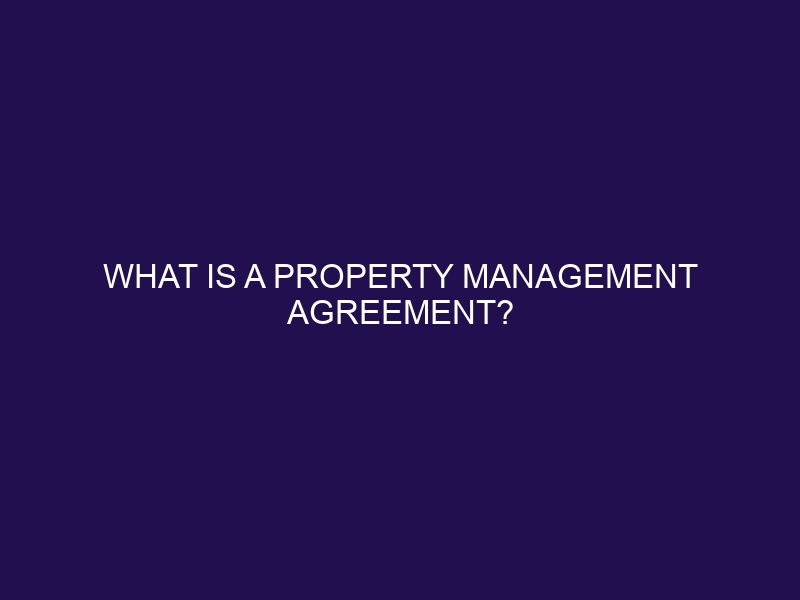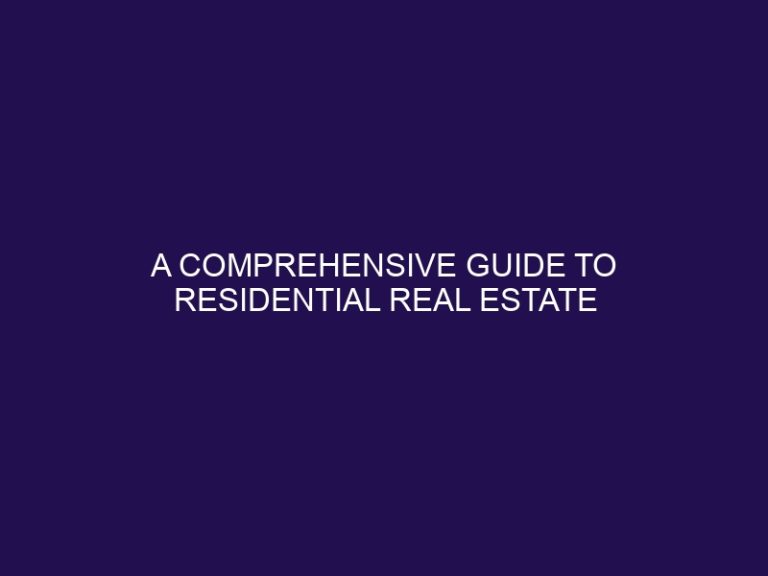What Is a Property Management Agreement?
A property management agreement is a legally binding contract between a property owner and a property management company or individual. This agreement outlines the terms and conditions regarding the management of the property and the responsibilities of both parties involved. It serves as a crucial document in ensuring effective property management and protecting the rights and interests of the property owner and the manager.
Key Components of a Property Management Agreement include:
- Identification of Parties Involved
- Scope of Services
- Duration and Termination
- Compensation and Fees
- Responsibilities and Obligations of the Property Manager
- Rights and Duties of the Property Owner
- Maintenance and Repairs
- Marketing and Tenant Placement
- Financial Management and Reporting
The importance of a property management agreement lies in several factors:
- Clear Expectations and Responsibilities: It establishes clear expectations and outlines the duties and responsibilities of both the property owner and the manager.
- Legal Protection for Both Parties: The agreement provides legal protection for both parties in case of disputes or breaches of contract.
- Effective Communication and Conflict Resolution: It facilitates effective communication and provides a framework for resolving conflicts or disagreements.
- Efficient and Professional Property Management: A well-drafted agreement ensures efficient and professional property management, leading to smooth operations and optimal returns for the property owner.
Common issues and disputes that may arise in property management agreements include failure to fulfill obligations, payment and fee disputes, lease violations, and termination and contract breaches.
To create a strong property management agreement, consider the following tips:
- Clearly Define Services and Expectations: Clearly articulate the services to be provided and the expectations of both parties.
- Include Specific Terms and Conditions: Include specific terms and conditions regarding rent collection, maintenance procedures, tenant placement, and other relevant aspects.
- Seek Legal Advice and Review: Seek legal advice to ensure compliance with local laws and regulations and have the agreement reviewed by an attorney.
- Regularly Review and Update the Agreement: Regularly review and update the agreement to reflect any changes in the property management arrangement.
By entering into a comprehensive and well-crafted property management agreement, property owners can ensure a smooth and successful management of their property while protecting their rights and interests.
Definition and Purpose of a Property Management Agreement
A property management agreement is a legal contract that defines and serves the purpose of outlining the responsibilities, obligations, and terms of the professional relationship between a property owner and a property manager. The main goal of this agreement is to establish clear expectations, protect both parties legally, and ensure efficient and professional property management. The agreement encompasses several key components, such as identifying the parties involved, specifying the scope of services, including the duration and termination clauses, determining compensation and fees, and outlining the rights and duties of both parties. By drafting a robust property management agreement, property owners can effectively delegate the management of their property while retaining control and minimizing potential disputes. As an interesting fact, it is worth noting that the property management industry in the United States generates an annual revenue of more than $88 billion.
Importance of Having a Property Management Agreement
Having a property management agreement is crucial for both property owners and managers. This agreement provides clarity, sets expectations, and protects the interests of both parties involved.
The importance of having a property management agreement lies in the clear expectations it establishes. A well-defined agreement outlines the scope of services, responsibilities, and obligations of the property manager, ensuring that everyone is on the same page.
Additionally, the agreement provides legal protection for both parties. By clearly stating the terms and conditions, it safeguards against potential disputes or breaches that may occur.
Moreover, a property management agreement promotes effective communication. It establishes clear and open channels for communication, enabling prompt resolution of any conflicts or issues that may arise.
Furthermore, having a formal agreement in place makes property management more professional and efficient. It enhances the overall experience for owners and tenants alike.
To create a strong property management agreement, it is essential to clearly define services, include specific terms and conditions, seek legal advice, and regularly review and update the agreement to adapt to changing circumstances.
Key Components of a Property Management Agreement
When diving into the world of property management, understanding the key components of a property management agreement is vital. In this section, we’ll break down the crucial elements that make up such an agreement, including the identification of the parties involved, the scope of services provided, the duration and termination clauses, compensation and fees, responsibilities and obligations of the property manager, rights and duties of the property owner, maintenance and repairs, marketing and tenant placement, as well as financial management and reporting. Get ready to uncover the essential elements that shape a successful property management agreement.
Identification of Parties Involved
The identification of parties involved is an essential aspect of a property management agreement. It ensures clarity and establishes the roles and responsibilities of each party. Here is a table that outlines the key stakeholders in a property management agreement:
| Party | Description |
|---|---|
| Property Owner | The individual or entity that owns the property and seeks management services. |
| Property Manager | The professional or company hired to manage the property and oversee its operations. |
| Tenants | Individuals or businesses that occupy and rent the property. |
| Maintenance Staff | The team responsible for maintaining and repairing the property. |
Having a clear understanding of the parties involved lays the groundwork for a successful property management agreement and enables effective communication and collaboration.
Fun Fact: A well-crafted property management agreement can help avoid disputes and legal issues, contributing to a smooth and efficient management process.
Scope of Services
A property management agreement outlines the Scope of Services provided by a property manager to the property owner. This includes tasks such as marketing and tenant placement, maintenance and repairs, financial management and reporting, and more.
Marketing and Tenant Placement: The property manager is responsible for advertising the property and finding suitable tenants.
Maintenance and Repairs: The property manager ensures that the property is well-maintained and handles any repairs or maintenance issues that arise.
Financial Management and Reporting: The property manager collects rent, pays expenses, and provides detailed financial reports to the property owner.
Fact: A comprehensive Scope of Services in a property management agreement helps ensure that all parties are clear on their responsibilities, leading to efficient and effective property management.
Duration and Termination
The duration and termination of a property management agreement are vital considerations for both the property manager and the property owner. It is essential to establish a clear and mutually agreed-upon timeframe for the agreement and to outline the circumstances under which it can be terminated. The agreement should also specify any notice period required for termination. This ensures that both parties have a transparent understanding of their rights and obligations and provides protection in case of disputes. Regularly reviewing and updating the agreement is also recommended to adapt to changing circumstances and ensure its continued effectiveness.
Throughout history, duration and termination clauses in property management agreements have played a significant role in resolving disputes and safeguarding the interests of both parties involved.
Compensation and Fees
- Compensation: A property management agreement specifies the compensation structure for property managers. This can include a percentage of the property’s rental income or a flat fee.
- Fees: Property management agreements outline any additional fees that may be charged, such as advertising fees, maintenance fees, or lease renewal fees.
- Transparent Pricing: A good property management agreement should clearly outline all compensation and fees to avoid any misunderstandings or disputes.
- Payment Schedule: The agreement should also include details about when and how the property manager will be paid.
In 1852, the first recorded property management agreement was signed between the owners of the Astor House hotel in New York City and the hotel’s manager. This agreement established clear compensation and fees for the manager’s services, setting a precedent for future property management agreements.
Responsibilities and Obligations of the Property Manager
- The responsibilities and obligations of a property manager include:
- Ensuring property maintenance by addressing repairs and conducting regular inspections.
- Managing tenant inquiries, screening applicants, and handling lease agreements.
- Collecting rent from tenants and enforcing late payment policies.
- Maintaining accurate records of income and expenses, preparing financial reports, and handling budgeting.
- Staying updated on rental laws, regulations, and building codes to ensure legal compliance.
- Being available for emergencies and coordinating repairs or services as needed.
Property managers play a crucial role in ensuring the smooth operation and value optimization of rental properties.
Rights and Duties of the Property Owner
The rights and duties of the property owner are vital components of a property management agreement. The property owner holds the right to establish expectations, delegate responsibilities, and make decisions concerning the property. It is their responsibility to provide the necessary resources, including funds for repairs and maintenance, and to ensure compliance with legal obligations, such as meeting safety standards. Additionally, the property owner has a duty to effectively communicate with the property manager and promptly address any concerns or issues. By understanding their rights and fulfilling their duties, property owners can maintain a prosperous partnership with their property manager.
Maintenance and Repairs
When it comes to maintenance and repairs in a property management agreement, it is crucial to establish clear guidelines and responsibilities. This can be achieved through the following steps:
- Clearly define the maintenance and repair duties of the property manager, incorporating regular inspections, addressing tenant complaints, and coordinating necessary repairs related to maintenance and repairs.
- Specify the scope of maintenance and repairs covered by the property manager, including routine upkeep, emergency repairs, and major renovations in the context of maintenance and repairs.
- Establish a reporting system for tenants to easily communicate maintenance issues and track repair progress for maintenance and repairs.
- Outline the timeline for addressing maintenance requests, ensuring prompt action and resolution of issues pertaining to maintenance and repairs.
- Include clauses regarding how maintenance and repair costs will be handled, whether it is the responsibility of the property owner or the tenants involved in maintenance and repairs.
- Include provisions for hiring contractors or vendors for specialized repairs or maintenance tasks related to maintenance and repairs.
- Include a clause for regular property inspections to identify potential maintenance needs and address them proactively in terms of maintenance and repairs.
- Outline the process for handling property damage caused by tenants and the corresponding financial responsibility connected to maintenance and repairs.
- Include provisions for regular maintenance and servicing of essential systems, such as HVAC, plumbing, and electrical, necessary for maintenance and repairs.
- Include clauses for handling emergency repairs and establishing 24/7 contact information for emergencies concerning maintenance and repairs.
Marketing and Tenant Placement
Marketing and tenant placement are critical components of a property management agreement.
- Marketing: A strategic marketing plan is essential for the property manager to effectively advertise and promote the property. Utilizing online platforms, social media, and professional networks can greatly assist in attracting potential tenants.
- Tenant Placement: The property manager has the responsibility of carefully screening and selecting qualified tenants. This entails conducting thorough background checks, verifying income, and checking references.
A fact worth noting is that efficient marketing and tenant placement can minimize vacancy periods and maximize rental income for property owners.
Financial Management and Reporting
Financial management and reporting are crucial components of a property management agreement. This involves handling the finances of the property, including rent collection, budgeting, and financial reporting to the property owner. It ensures transparency and accountability in managing the property’s income and expenses.
Here is an example of a table showcasing the
| Financial Management and Reporting |
|---|
| – Rent collection |
| – Budgeting |
| – Financial reporting |
In a similar tone, a true history is the creation of the first modern accounting system in medieval Venice. This system was recognized as the predecessor of modern financial management and reporting practices, demonstrating the importance of managing finances in various sectors.
Importance of a Property Management Agreement
When it comes to property management, having a solid agreement in place is crucial. In this section, we’ll explore the importance of a property management agreement and how it can benefit both parties involved. From setting clear expectations and responsibilities to providing legal protection, effective communication, and professional management, a well-crafted agreement ensures a smooth and efficient property management experience. So, let’s dive in and discover why this agreement is an essential component for success in the real estate industry.
Clear Expectations and Responsibilities
Creating a property management agreement with clear expectations and responsibilities is imperative for establishing a smooth and fruitful working relationship between property owners and managers. Some key points to consider:
- Clearly define the scope of services provided by the property manager, encompassing tasks such as tenant screening, rent collection, and property maintenance.
- Specify the responsibilities of both parties, explicitly outlining the property owner’s obligation to provide necessary funds for repairs and the property manager’s duty to maintain records and communicate effectively.
- Outline expectations for property inspections, emergency response times, and lease enforcement.
- Include provisions for resolving conflicts and distinctly define the process for terminating the agreement.
Legal Protection for Both Parties
A property management agreement provides legal protection for both parties involved in property management, such as property owners and managers. It clearly outlines the rights, responsibilities, and expectations of each party, reducing the risk of disputes or misunderstandings. The agreement safeguards the property owner’s interests by ensuring that the property manager fulfills their obligations, including tenant screening, maintenance, and financial management. It also provides legal protection for both parties by establishing clear terms for compensation, termination, and scope of services. Seeking legal advice and regularly reviewing and updating the agreement can further enhance the legal protection for both parties, ensuring their interests are safeguarded. Pro-tip: Always document any changes or updates to the agreement to avoid future conflicts and maintain the necessary legal protection for both parties involved.
Effective Communication and Conflict Resolution
Effective communication and conflict resolution are crucial aspects of a property management agreement. Ensuring effective communication and resolving conflicts is essential for a successful property management partnership. Here are some steps to naturally incorporate effective communication and conflict resolution:
|
Efficient and Professional Property Management
Efficient and professional property management is essential for ensuring a smooth and successful operation. To achieve this, property managers should prioritize the following key factors:
By implementing these practices, property managers can foster efficient and professional property management. This approach maximizes tenant satisfaction and enhances overall property performance.
Common Issues and Disputes in Property Management Agreements
When it comes to property management agreements, encountering common issues and disputes is not uncommon. From failure to fulfill obligations to payment and fee disputes, as well as lease violations and tenant issues, and even termination and contract breaches, there is a myriad of challenges that can arise. In this section, we will delve into these issues, offering insights and potential solutions to navigate these obstacles successfully. So, if you want to avoid potential headaches and ensure a smooth property management experience, this is the section for you.
Failure to Fulfill Obligations
A property management agreement is a legally binding contract that outlines the terms and responsibilities between a property manager and a property owner. Issues can arise when one party fails to fulfill their obligations, resulting in failure to fulfill obligations. This can include negligence in property maintenance, failure to find tenants, or inadequate financial reporting. Such failures can lead to strained relationships, legal disputes, and financial losses for both parties. To illustrate this point, consider a scenario where a property owner hired a property manager who neglected to perform routine maintenance, causing extensive damage to the property and a loss of rental income. This situation serves as a clear example of the consequences that can arise due to failure to fulfill obligations. Therefore, it is crucial to carefully select a reliable property manager and establish a clear agreement in order to prevent such failures from occurring.
Payment and Fee Disputes
Payment and fee disputes are a common occurrence in property management agreements, sometimes causing strain on the relationship between property owners and managers. To avoid such issues, it is crucial to establish precise payment terms and fees in the agreement. Here are some important considerations to address payment and fee disputes:
- Clearly stipulate the agreed-upon payment schedule, including the due dates and acceptable methods of payment, to avoid any confusion.
- Thoroughly explain the fees associated with management services, such as monthly management fees, leasing fees, and maintenance fees, to ensure transparency.
- Define any additional expenses that may be incurred and provide a plan for how they will be reimbursed or handled to avoid any misunderstandings.
- Create a process for resolving payment disputes, including the option of involving a mediator or arbitration if necessary, to find an impartial resolution.
- Maintain detailed and transparent financial records to effectively track payments and fees, reducing the chances of disputes arising.
By diligently addressing payment and fee disputes in the property management agreement, both parties can maintain a clear understanding of their financial obligations and potentially prevent conflicts.
Lease Violations and Tenant Issues
Lease Violations and Tenant Issues can present significant challenges for property managers. Addressing these problems promptly is crucial for maintaining a peaceful and harmonious rental environment. Here are some common issues and violations to consider when managing rental properties:
- Non-payment of rent: It is essential to implement a clear rent collection process and enforce consequences for late payments.
- Property damage: Regular inspections should be conducted to promptly address any damages caused by tenants.
- Unauthorized occupants or pets: Occupancy and pet policies must be clearly outlined in the lease agreement to prevent unauthorized individuals or animals from residing in the property.
- Violation of lease terms: Tenants should fully understand and adhere to lease terms, and proper documentation should be provided for any violations.
In one instance, a property manager discovered that a tenant had sublet the property without permission, resulting in Lease Violations and Tenant Issues. The unauthorized occupants were causing disturbance and engaging in illegal activities, which led to complaints from neighbors. The property manager took immediate action by evicting the unauthorized occupants and restoring peace to the neighborhood. This incident emphasizes the importance of regular property inspections and vigilance in identifying and addressing Lease Violations and Tenant Issues.
Termination and Contract Breach
Termination and Contract Breach are critical aspects of a Property Management Agreement. Proper handling of these issues is essential to maintain a successful professional relationship between the property manager and the property owner. Here is an overview of these topics:
| Termination | Contract Breach |
| – Clearly define the conditions under which the agreement can be terminated. | – Identify specific breaches that would warrant contract termination. |
| – Include notice periods to allow for a smooth transition and minimize disruptions. | – Outline the steps for resolving disputes and breaches. |
| – Specify any financial obligations upon termination. | – Clearly state the consequences of contract breach, such as penalties or legal action. |
To ensure a strong Property Management Agreement, consider the following suggestions:
- – Seek legal advice to ensure the agreement is comprehensive and legally binding.
- – Regularly review and update the agreement to reflect any changes in circumstances or regulations.
- – Clearly communicate and document expectations and responsibilities to avoid misunderstandings.
- – Establish effective channels of communication and conflict resolution to address any issues promptly.
- – Research and understand local laws and regulations related to property management agreements.
Tips for Creating a Strong Property Management Agreement
When it comes to creating a strong property management agreement, there are a few essential tips you don’t want to miss. Clearly defining services and expectations, including specific terms and conditions, seeking legal advice, and regularly reviewing and updating the agreement are key factors for success. In this section, we’ll dive into these crucial elements, giving you valuable insights to enhance your property management agreement game. So, let’s get started and ensure your agreements are rock solid!
Clearly Define Services and Expectations
Clearly defining services and expectations is of utmost importance when creating a property management agreement. This is vital to ensure that both the property owner and the property manager are in sync and possess a comprehensive understanding of their respective roles and responsibilities. By explicitly outlining the scope of services, tasks, and expectations, any potential misunderstandings can be avoided. For instance, a property management agreement can state the specific responsibilities of the property manager, such as advertising the property, conducting tenant screenings, and handling maintenance requests. This level of clarity plays a crucial role in preventing conflicts and strengthening the professional relationship between the property owner and the manager.
In the past, a property owner once entered into a property management agreement without clearly defining services and expectations. Consequently, the property manager overlooked important maintenance tasks, resulting in tenant complaints and a decline in rental income. This unfortunate scenario could have been easily prevented if both parties had thoroughly discussed and documented their specific responsibilities in the agreement.
Include Specific Terms and Conditions
Creating a property management agreement with specific terms and conditions is crucial for both property owners and managers. It is important to include specific terms and conditions in the agreement to establish clear expectations and protect the rights of all parties involved.
- Property details: It is important to include the property address, type, and any specific requirements or restrictions.
- Services: The scope of services to be provided, including maintenance, repairs, tenant screening, and lease enforcement, should be clearly outlined.
- Termination: The duration of the agreement and the conditions under which it can be terminated by either party should be specified.
- Compensation: It is necessary to state the fees and payment terms, such as a flat fee or a percentage of rental income.
- Responsibilities: The duties and obligations of both the property manager and the owner should be outlined.
In a true story, a property owner and manager signed an agreement without clarifying the specific terms regarding property maintenance. This led to disputes and confusion when the manager failed to perform certain maintenance tasks. Having specific terms and conditions in the agreement could have prevented this issue and ensured a smoother working relationship.
Seek Legal Advice and Review
When creating a property management agreement, it is crucial to seek legal advice and review. This ensures that the agreement is thorough, legally binding, and protects the interests of both parties involved. Seeking legal advice and review allows legal professionals to provide guidance on industry regulations, potential pitfalls, and draft clauses that address specific concerns. Furthermore, they can periodically review the agreement to ensure it remains up-to-date and compliant with any changes in laws or regulations. By incorporating the practice of seeking legal advice and review, property owners and managers can have peace of mind knowing that their agreement is strong and enforceable.
Regularly Review and Update the Agreement
Regularly reviewing and updating the property management agreement is crucial for both the property manager and owner. It ensures that the agreement remains relevant and reflects any changes in the property or the market conditions. By regularly reviewing the agreement, both parties can identify any areas that need improvement or adjustment. Updating the agreement allows for the inclusion of new terms or the modification of existing ones to better align with current needs and expectations. This practice promotes transparency, efficiency, and a healthier working relationship between the property manager and owner. Ultimately, regularly reviewing and updating the agreement helps protect both parties’ interests and promotes the smooth management of the property.
Frequently Asked Questions
What is a property management agreement?
A property management agreement is a contract between a property owner and a property manager that outlines their responsibilities and partnership. It clarifies the roles and expectations of both parties involved in the management of a rental property.
What key documents should be included in a property management agreement?
Key documents that should be included in a property management agreement are the full legal names of those signing, the effective date of the contract, a clear description of the property management services to be provided, and any additional terms or conditions agreed upon.
Do I need a rental license to enter into a property management agreement?
The requirements for a rental license vary depending on the state and jurisdiction. It is important to research and ensure compliance with local laws and regulations before entering into a property management agreement. Consulting with an attorney or local housing authority can provide guidance on licensing requirements.
What are the daily operations handled by a property management firm?
A property management firm is responsible for various daily operations of a rental property, which may include tasks such as tenant screening, lease agreements, rent collection, maintenance and repairs, handling tenant calls and inquiries, and addressing any issues that may arise with the rental unit.
Can a property management agreement be customized for my rental portfolio business name?
Yes, a property management agreement can be customized to include the rental portfolio business name if desired. It is important to include accurate and updated information about your business to ensure clarity and transparency in the agreement.
Is it necessary to conduct lead tests in rental properties, and should it be addressed in the property management agreement?
Lead testing requirements may vary depending on state and local regulations. It is important to be aware of any lead testing obligations in your area and ensure compliance with the law. Addressing lead testing responsibilities and requirements can be included in the property management agreement to ensure clarity and adherence to necessary safety standards.







